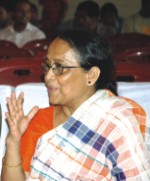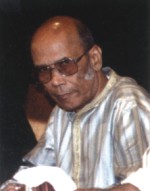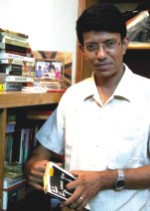|
Event
A Brush with Some Writers
Elita Karim
 |
Selina Hossain |
This year, the Ekushey Boi Mela is introducing a series of writers whose works include essays on national and international politics, science fiction, poetry, short stories, women's rights ssues, history and much more. Many of them speak about the current political situation in Bangladesh, portray the changes in relationships in the society, not to mention the redefined identity that the youth portray today -- all worldly and multicultural. Selina Hossain's "Purno Chobir Mognota" was very recently published and launched at the Boi Mela, by Onnyo Prokash. The story revolves around the times spent by Rabindranath Tagore in Shahjadpur, Silahadha and Patisara a hundred years ago. Selina Hossain has been researching this subject since 1997 and claims to have been a little apprehensive before publishing the book. "My novel is based on Tagore, something that has never been written before in Bangladesh," she says. "Such novels, however, have been written in West Bengal. I mentioned this to Sunil Gangyapadhayay. He was extremely encouraging and exclaimed that a novel is a mere story threaded by the writer. Readers are intelligent enough to understand this concept."
Hossain says that she was blown away by the fantastic response that she received on the book. "I was fairly surprised with the fact that a number of young boys and girls read my book and loved it!" she says. "We have this perception regarding the young generation that they do not read or are not interested in our heritage and history. I believe we should not come to such conclusions. Several young people got in touch with me after reading the book and had several questions to ask. I was thoroughly impressed."
 |
Syed Shamsul Haque |
Yet another book written by Hossain is a compilation of stories on women written by writers from South Asia. "I collected a number of stories from the eight countries in South Asia," she says. "At one point, however, I needed more quality stories and did not know where to collect them from. That was when I got in touch with Debjani Sen Gupta, Professor from Delhi University. She helped me collect a few more stories for my compilation. Debjani and I edited the book together." This book, published by Somoy Prokash, has gained a lot of popularity amongst readers in a very short while. "Nowadays, there are many who are concerned about gender issues in the subcontinent," she says. Readers including elderly men, women and young students have positively responded to the book.
Much to the delight of children, "Chaander Buri Pantha Ilish", by Selina Hossain, published by Jonota Prokash was launched at the fair. "The main character in this book is a daini (witch)," she exclaims. This daini is not your everyday conventional witch with a hideous face who roams about the countryside looking for naughty children for dinner. In this book, the witch is a friend to the children and buys them sweets and ice cream. "Traditionally, in every other folk tale, a woman plays this negative role, scaring children," says Hossain. "I decided to bring out the positive elements in this woman, who is loved by the children. The old daini also spends time reading to the children as well."
Two more books by Selina Hossain are "Ghor Grihosthir Rajniti" published by Ittadi and "Nijeke Koro Joy" published by Shahittyo Bilash. Both these books are compilations of essays written on women issues by Hossain herself. "In one of the essays, I have discussed the many terms and expressions used in Bangla which literally put down women," she explains.
 |
Dr. Azfar Hussain |
"I believe that every human being is born with a clean soul," says writer Syed Shamsul Haque. Sometimes, certain circumstances in life take control of people's actions, he adds. Based on this idea, Haque wrote "Moyla Jamae Fereshtara" which was launched very recently at the Ekushey Boi Mela by Ittadi. According to him, in spite of the character's sinful actions and inappropriate behaviour in society, he is blessed with a clean heart. Some readers say that it is easy to relate to the characters in this book, especially those who are presently growing up in Dhaka city. "I hope to get a positive response from both the young and elderly readers," says Haque. "However, unlike popular fiction or short stories, it takes time to respond to a novel. I am not expecting any immediate response to my novel as yet."
A book of poetry, titled "Aamar Shomadhi Kaler Proshadhon" written by Haque was launched by Ononna at the fair as well. "In recent times, I have lost many close friends, including Selim Al-Deen and Debdas Chakraborty," says Haque. "Death is like starting another journey which we all have to take sooner or later. It is hard to imagine that these people had dreams, hopes, and aspirations and wanted to do something for the country. The next thing you know, you are being cleaned and made ready to take the final journey. My book of poems is a reflection on this mood."
Haque's other works launched at the book fair are a collection of his own plays, "Shathti Natok", a collection of essays from Somoy publishers, "Phire Esho Bangladesh" from Ekushe Bangla publishers and a collection of short stories titled "Jaleswarir Golpo Gulo" from Jonota publishers. The stories are based on an imaginary town called Jaleswari.
Dr. Azfar Hussain, for the very first time, is bringing out six of his books at the Ekushey Boi Mela. "The Wor(l)d in Question" is a book of essays written by Hussain between 2002 and 2004. While teaching at Washington State University, Hussain along with many others were getting involved in the anti-war movement that was gaining a remarkable momentum in the US. His essays reflect these feelings and also the people's voices, which were played a huge role in the movement.
"The Politics of Subjects, Sites, and Scene" is a 300-page book written in Bangladesh in 2007. "It includes the Edward Said Memorial Lecture on revolutionary Latin American poetry he gave at Old Dominion University in the US in 2003," Hussain remarks. "The third book 'Samrajjobad o Sangskritik Rajnati' includes some essays I wrote in Bangla for journals and newspapers last year," he says. "In addition, the book has a number of essays I wrote between 1993 and 1994, when I was on the editorial board of a national news weekly called Samay."
"Pathon: Shobdo o Noishabder Rajnati" written between 1993 and 1995, is a book that offers anti-colonial and even political-economic readings of a range of Bangali cultural and literary productions from Lalon Fakir to Nazrul Islam. "This book was partly prompted by my own political work of culture at the Bangladesh Lekhok Shibira national organisation of writers for which I worked as a general secretary." These books have been published by Samhati Publications and recently launched at the Ekushey Boi Mela.
Paathsutra publications brought out Hussain's "Keramatnama o Tinti Galpa", a number of short satirical pieces that Hussain contributed to the Khoborer Kagoj back in the 1990s. "This compilation, including three experimental short stories, revolves around middle-class bigotry, cultural colonialism, and political chicanery," says Hussain.
"The last book, Chiihnno Bhashey Obosheshey, is a sustained, non-linear travel-narrative that deals with interconnected physical and psychological spaces and events," says Hussain. Published by Jatiya Grantha Prakashan, Hussain wrote this narrative all through 1995.
Even amidst the huge crowd of people at the Eksushe Boi Mela, these writers are making it a point to visit the fair as regularly as possible. "I wish the mela could arrange more events," says Syed Shamsul Haque. "For instance, an interactive session with the readers is, I believe, an event that should be organised on a regular basis." According to Selina Hossain, lack of space is a major problem that is getting worse with each year. "Having worked at Bangla Academy for several years, I know that it is very difficult to organise the fair in such a way that there is more space," she says. "To create more space, many stalls would have to be dropped the fair, which is bound to create more confusion." Azfar Hussain, who visited the mela after twelve long years, feels that in spite of the ongoing fight for space at the fair, the Ekushey Boi Mela, symbolising the Language Movement, is a special platform for readers, authors, and publishers to get together and mingle. It is a major national event that every self-conscious Bangali would attend.
Copyright (R) thedailystar.net 2007 |
